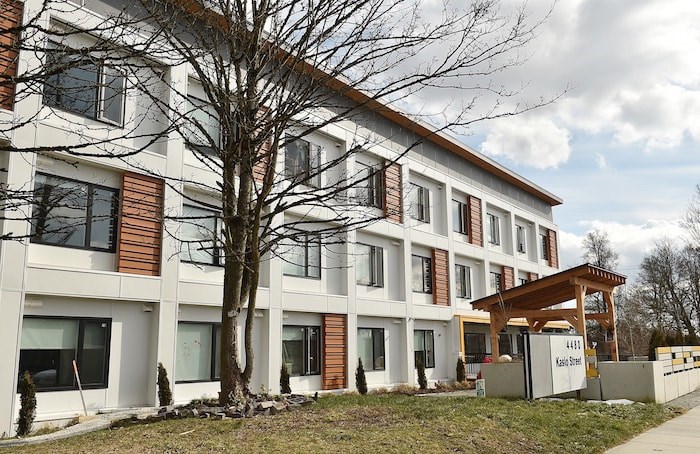 The 52-unit modular housing building on Kaslo Street is known as Sarah Ross House. It opened last summer. Photo by Dan Toulgoet/Â鶹´«Ã½Ó³»Courier
The 52-unit modular housing building on Kaslo Street is known as Sarah Ross House. It opened last summer. Photo by Dan Toulgoet/Â鶹´«Ã½Ó³»Courier
OneCity Coun. Christine Boyle has tweaked and resubmitted a motion, which had been deemed out of order at a council meeting before summer break, asking council to look at allowing temporary modular housing in single-family and duplex zones. The motion also wants the city to explore opportunities for more housing for lower-income families throughout all Â鶹´«Ã½Ó³»neighbourhoods.
The original âEvery Neighbourhood for Everyoneâ motion was  because portions of it referenced city work thatâs already underway.
Boyleâs modified motion, which is , covers much of the same territory.
Boyle argues Vancouverâs homelessness problem is a âhumanitarian crisisâ that the city is âmorally obligatedâ to address.
The 2019 homeless count revealed 2,223 people were without homes in the city âsince staff started tracking the problem.
Through her motion, Boyle wants council to direct staff to explore and report back on opportunities to allow temporary modular housing buildings for homeless people on private and city-owned land in single-family and duplex [RS and RT] zones, which are large enough to accommodate the use. The report, which sheâd like to see by the end of the year, would include information about access to services, transit and timing of future uses.
If staff identify opportunities, Boyle wants the report to include policy tools that would be required to permit temporary modular housing in those zones such as changes to the Â鶹´«Ã½Ó³»Charter and/or new zoning policies.
Boyle further wants council to direct staff to look into new possibilities for creating permanent homes for low- and moderate-income families and individuals in all city neighbourhoods through the , as well as through the implementation of the cityâs Housing Â鶹´«Ã½Ó³»and Affordable Housing Delivery and Financial strategies, including:
- the city buying RS- or RT-zoned properties to use for temporary modular housing, with the potential future use for permanent rental and non-market housing options
- consideration of the development of an Affordable Housing Land Acquisition Strategy that would include a study into annual affordable housing land needs, estimated land costs, location selection criteria and an affordable housing funding strategy, including recommended levels of funding from taxation and new development
- emerging possibilities for family-sized modular housing units
- the potential for pre-approving social and non-market housing projects in all parts of the city to make the development of affordable housing faster and less risky.
Boyle hopes her motion, which she calls "ambitious" passes without major changes.
"We know we are in a housing crisis, and that it is most acutely impacting low-income people. We need ambitious and compassionate new ideas for how we will respond. We all acknowledge that we need more low-income housing, and Iâm suggesting we fast-track it, and that we build at least some of it on land that is the least expensive land per square foot in the city," she told the Courier in an email.
While Boyle suspects the prospect of low-income housing in wealthier neighbourhoods will "ruffle some feathers" she maintains it's necessary.
"... We have neighbours sleeping on the street and in parks because they have nowhere else to go. Some of us may need to be a tiny bit less comfortable so that others can have a warm place to rest their head. Everyone deserves a home."


